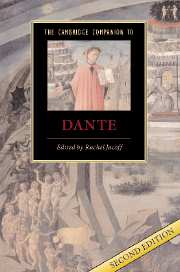Book contents
- Frontmatter
- 1 Life of Dante
- 2 Dante and the lyric past
- 3 Approaching the Vita nuova
- 4 From auctor to author: Dante before the Commedia
- 5 Introduction to Inferno
- 6 Introduction to Purgatorio
- 7 Introduction to Paradiso
- 8 Dante and the Bible
- 9 Dante and the classical poets
- 10 Allegory and autobiography
- 11 A poetics of chaos and harmony
- 12 The theology of the Comedy
- 13 The poetry and poetics of the creation
- 14 Dante and Florence
- 15 Dante and the empire
- 16 Dante and his commentators
- 17 Dante in English
- Further reading
- Index
- Series List
4 - From auctor to author: Dante before the Commedia
Published online by Cambridge University Press: 28 May 2007
- Frontmatter
- 1 Life of Dante
- 2 Dante and the lyric past
- 3 Approaching the Vita nuova
- 4 From auctor to author: Dante before the Commedia
- 5 Introduction to Inferno
- 6 Introduction to Purgatorio
- 7 Introduction to Paradiso
- 8 Dante and the Bible
- 9 Dante and the classical poets
- 10 Allegory and autobiography
- 11 A poetics of chaos and harmony
- 12 The theology of the Comedy
- 13 The poetry and poetics of the creation
- 14 Dante and Florence
- 15 Dante and the empire
- 16 Dante and his commentators
- 17 Dante in English
- Further reading
- Index
- Series List
Summary
Before, during, and after the writing of his Commedia, surely the most “authoritative” work of the Western canon, Dante composed a considerable number of poetic, prose, and prosimetrum works, both in Italian and in Latin. Of these, several - Vita nuova (The New Life), Convivio (The Banquet), De vulgari eloquentia (On Eloquence in the Vernacular), and the Monarchia (Of World Empire), not to mention the four great canzoni known as the rime petrose, and two Latin eclogues, the first written since late antiquity - would in the absence of the masterwork still have been recognized as among the most significant and distinctive writings of the later Middle Ages, for a combination of historical, aesthetic, intellectual, and broadly cultural reasons. Just to start with, there is no contemporary poet writing in Italian whose range of topics and forms, and whose intellectual, moral and political ambition, begin to compare with those of Dante's “other” works. Because of the immense shadow cast by the Commedia, however, these works are less studied and appreciated than they deserve and, even when they are, it is usually in subordinate relation to the Dantean masterpiece.
In this essay I will focus on three of the principal “minor” works, Vita nuova, Convivio, and De vulgari eloquentia, using as a touchstone a fundamental concern of Dante that, indeed, culminates in the Commedia, namely the appropriation of what the Middle Ages called auctoritas, or cultural authority, for a person (Dante Alighieri) and a language (the romance vernacular on its way to becoming what we now call Italian) that would not ordinarily have been considered entitled to claim such status. In the process I hope to give some indication of why one might be interested in these works for their own sakes.
- Type
- Chapter
- Information
- The Cambridge Companion to Dante , pp. 46 - 66Publisher: Cambridge University PressPrint publication year: 2007
- 1
- Cited by

